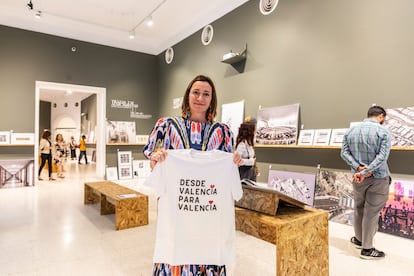The Spanish chef Begoña Rodrigo (Valencia, 49 years old) attends the Museum of Arts of the University of Guadalajara (MUSA) carrying a t-shirt with the legend From Valencia to Valenciain a gesture of solidarity with that region of Spain hit by the Dana that caused more than 200 deaths. The chef, who has made vegetables her star ingredients, participated on Sunday in a talk about food with her colleagues Ferran Adrià, from Spain, and the Mexican Fabián Delgado, organized within the framework of the Guadalajara International Book Fair ( FIL). Rodrigo, considered the best vegetable chef in Europe, awarded last year by We’re Smart World, spoke with this newspaper, before the talk, about her experience in the world of vegetables, the return to the garden as a center of food production and how tastes must change to give vegetables as important a place as foie or caviar. He will prepare a menu throughout the fair, including paella, pasta, potato omelettes and perhaps with a touch of spice, because, he says, he loves Mexican chili peppers. “The idea is to do some live cooking, so that those who are lucky and who I like can eat,” says this kind, unpretentious and pleasantly conversational, Michelin-star chef, jokingly. This world-famous gastronome talks about the plant world, the alchemy she does with vegetables and the situation of women in haute cuisine.
Ask. You have been exploring the world of vegetables for 15 years, does it still surprise you?
Answer. Everything surprises me. We started cooking vegetables because we had a restaurant where a lot of Nordic customers came and they assumed that we had to have a vegetarian option, and since I am a vegetable consumer, it seemed much easier for me and I enjoyed doing it more. We have been taught to cook perfect fish and meat, but vegetables were what was left aside. For me, in gastronomy today the surprise is in the vegetable part. Cows may have more or less fat, but there is less difference, as do chickens and even fish, but vegetables are very particular depending on the region.
P. What do vegetables now represent for haute cuisine?
R. They are a challenge. We have to make a customer feel that the price they pay for a vegetable is as important as the price they pay for foie or caviar. There should be no discussion when they serve you a good vegetable, you know the process that goes into it until it is placed on the table and that people appreciate it in the same way as other foods that intrinsically carry the sign of expensive par excellence.
P. Do people appreciate vegetables more than fish or steak? Have tastes changed?
R. I’m going to answer you in a very Galician way: it depends on where those people come from. In Spain it still costs a lot, there is still the culture of the product of a good chop or a good fish. If you go to northern Europe they are already very clear about it, especially because of the personal good that comes from eating healthy, investing in their body is already well-introduced into the culture and they do appreciate when they eat something different based on vegetables.
P. What is your research process for creating a vegetable dish?
R. The first thing you have to do is work closely with the people who produce it. With small producers we have a strategy for the product that is going to be planted from the beginning of the year to the end and from there the menus are created. Taste comes first and then aesthetics.
P. Do you test each product? It’s a bit like alchemy in gastronomy.
R. I once had the opportunity to be with musicians and cook for them while they were creating a record and I told them that I didn’t understand that they were recording the percussion on one hand, the wind on the other hand. And they told me that they thought the same about my dishes: they didn’t understand how I could bring together different tastes. That has to do with experience, because you sharpen the tastes, from the base, the acid, the bitter. When you have the tastes, the colors, everything that is art that you try to capture on the plate, you already look for the aesthetics and the tableware, because I think that a very important thing is that the cuisine enters through the eyes and the vegetables give a lot game in that sense.
P. Is returning to the garden like a political position?
R. It is tiring, it is not like going to buy meat, but you really have to have a more direct and special contact to have a good garden on your plates. Besides, you must count on Mother Nature, which is unpredictable. Now in Valencia there has been a damage and all the crops have disappeared. Or there is hail or a rise in temperature and all the dishes you were planning to make in the next three weeks are not made because that product has disappeared.
P. Is there something against meat?
R. I am not a meat consumer. I think meat, especially red meat, is not good for sustainability and not good for the human body. If you think about how much it costs the body to digest a taco of red meat, all the effort, I don’t know how worth it. I think you have to eat everything, not just vegetables, because your body needs everything to live, but in a much more moderate way. I could completely do without red meat, I do it a little out of ethics and because I don’t feel like it. And that means I don’t cook it either, because it bores me.
P. What are you experimenting with now?
R. We have started with a lot of pickles. Within the study of roots and tubers that we have done, we have been pickling them, because we have discovered that they have a lot of sugars and that they can become something sweet in a practically miraculous way. Now we are making 15 different vinegars, we have masses of vinegars that are more than four years old, one of figs that is wonderful and you can drink it. We are making vegetable charcuterie, trying above all that the customer has this point of surprise and appreciation of these most humble products.
P. He is now in Mexico, a country that has given the world tomatoes, avocados, and peppers. Do you have expectations of finding something new in these lands?
R. Every time you come to Mexico you find something new, especially with the topic of chili peppers. Yes, it is true that it surprises me, because they tend to cook everything to exaggerated extremes, including meats, and in the end, the product they have, which is very fresh, they manage to make it dense. I’m always looking for cuisines here that are lighter, because you have that precious thing in Mexico that is the communities, which are always rescuing native seeds. I like aguachiles, chives, potatoes, corn of all kinds, nixtamalizar. We nixtamalize tigernuts, which is something that has never been done before, to obtain another structure within the tigernut, which is what horchata is made with in Valencia. There are ancient techniques here to preserve things. There are these older ladies with their knowledge and I am very struck by being here at the FIL and that after 38 editions there has not been any woman as a gastronomic representative. I find it shocking.
P. What Mexican ingredient would you choose?
R. I always use chili peppers, because I love spicy food. Chili is important to me, serrano chilies, chile de arbol, which I love to infuse to make chocolate sweets.
P. Mention the topic of women in gastronomy. There is always talk of men in high positions, respected chefs. Has the industry changed for women?
R. Nothing has changed. And you feel it when you are in kitchens. I have been working in the kitchen for 30 years, 20 of them in Spain, and there are women who see themselves on the front line, there would be more to go, but the change has been little. We continue fighting for the same thing as in ’75.

P. It is contradictory, because women have always been in the kitchen.
R. Yes, but look, when you are the intrinsic cook you know that your wife is going to take care of your children, she is going to keep your diary, the telephone, she is going to take care of your house and she is going to act as your administrator. That’s four salaries. If you are a woman you should think that when you set up your restaurant you are going to have to have those salaries and many times restaurants do not give you that much. In this society I don’t know to what extent you say ‘it’s going to be worth it’, because sometimes you fight with all your might and you don’t get there. You need to create a very good network around you, in which people believe in you and you can move forward, when they, men, already have everything done from home.

